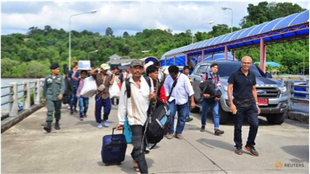Monitoring Focus on Migrant Worker Recruitment and Forced Labour Risks
During the last two years Electronics Watch has monitored migrant worker recruitment channels from Myanmar to Thailand, focusing on one of the largest electronics employers of migrant workers in Thailand, to help detect and eliminate debt bondage and other forced labour risks. Electronics Watch has recently expanded focus to the recruitment of migrant workers from Bangladesh, Indonesia, Myanmar, and Nepal to electronics factories in both Malaysia and Thailand.
Through extensive interviews with migrant workers and recruitment agents in sender and receiver countries, and through engaging other sources, such as unions and NGOs, Electronics Watch has documented forced labour risks resulting from high recruitment fees, employers withholding workers' passports and work permits to limit their freedom of movement, deception about the nature of employment during the recruitment process, and inability of workers to reject excessive overtime or resign from their work because of debt bondage or threats of dismissal or salary deduction.
Best practice examples where workers do not pay anything to obtain employment in foreign countries, have full access to their identification documents, work less than 60 hours per week, and provided decent living accomodation show that there are solutions to these problems. In one case, for example, company staff show evidence of oversight of receiver country agents, and the company pays agents in the sender countries the full recruitment costs to ensure they do not collect money from workers. Electronics Watch seeks full remedies for workers in forced labour while also promoting regional systemic solutions to ensure ethical migrant worker recruitment where workers do not incur any costs in the first place, have full access to their identification documents, are housed in decent accommodation, and earn a living wage for reasonable working hours.


